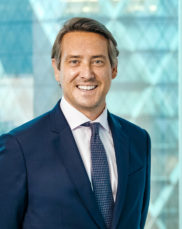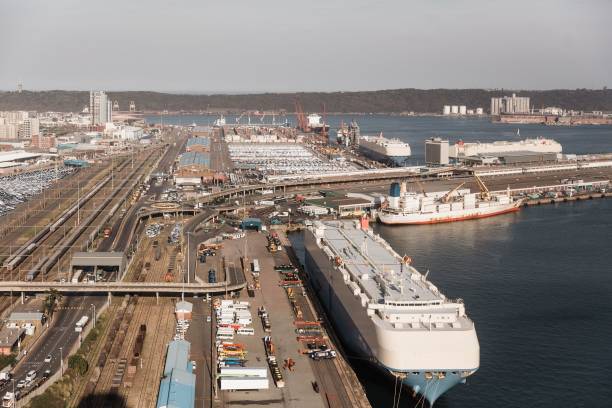Ports have dominated infrastructure discussions in the last two years, with increased congestion and bottlenecks as a result of Covid-19 holding back global economic recovery. Global ports are vital to trade – serving as gateways for 80% of trade merchandise by volume and 70% by value – and a key component of economic growth and economic diversification.
The situation in Africa is no different. Congestion and lack of infrastructure have inevitably led to delays, directly increasing costs and reducing competitivity.
This past decade has seen massive investments in African ports. From Dakar to Djibouti and Durban to Tangier, the African coast has seen the emergence of modern port infrastructure to serve the needs of a continent experiencing rapid growth.
Last month UK impact investor CDC announced a multi-billion-dollar commitment to support DP World’s investments as they seek to expand their activities in Africa. Two weeks later, however, French group Bolloré, present in 42 African ports and operating 16 container terminals, announced it was reviewing its operations on the continent, hinting that it may sell its port assets.
Clear opportunities for investment
For Andrew Dawes, CEO of Arise Ports & Logistics, who has spent the last two decades living and breathing ports in four continents, these announcements reflect the nuanced realities of the African market. While he admits that there is some saturation in some regions, Africa’s long-term growth fundamentals and unmet demand mean there are clear opportunities for investment.
Arise P&L is in many ways the product of 15 years of work. The company, officially incorporated last year, is one of three offshoots of Arise, a builder of industrial ecosystems, which itself grew out of the Gabon Special Economic Zone (GSEZ), which was created to house industry that would transform raw materials, principally timber, and develop palm oil plantations.

The GSEZ, a joint venture between Olam and the government of Gabon, grew organically to become a logistics powerhouse in the country, developing key infrastructure in Gabon including the port of Owendo. Following the restructuring of their operations, the port, which has both a container port and a minerals port, was separated into its own entity run by Arise P&L.
Today the company has over 500 employees and its shareholders include Olam (32%), the Africa Finance Corporation (AFC) (25%) and AP Moller Capital (APMC) (42%), an affiliate of A.P. Moller Holding and part of the A.P. Moller Group, which also owns Danish container logistics company AP Moller Maersk. In Gabon, the port is in partnership with French impact fund STOA, French investment fund Méridiam and the government of Gabon.
Success in San Pedro
Its new port in Côte d’Ivoire is the multipurpose industrial terminal at San Pedro (TIPSP in its French acronym), which is five hours by car from Abidjan. It will be a mineral port serving both export facing clients yearning for more capacity, and demand from within Côte d’Ivoire and landlocked countries such as Mali and Burkina Faso.
Dawes is particularly pleased with Arise P&L’s first foray outside Gabon. The government in Côte d’Ivoire has been supportive, he says, and the fact that road infrastructure from Abidjan to San Pedro has been upgraded with further ongoing works will only increase the port’s appeal and lift the country’s profile as a transport hub in West Africa.

Arise P&L have invested €170m and counting to date, with a second berth already under consideration due to strong demand. This would enable them to handle 12m tonnes a year, double what they handle in Owendo.
“We’re seeing growth in the commodities space,” says Dawes. “Manganese growth in the last few years since 2019 has been exceptional. Demand for some commodities has doubled, far exceeding our first forecasts. We are talking to a nickel exporter for example whose output is constrained by port capacity and congestion in Abidjan.
“We are closer to them than Abidjan and a natural outlet. However, with the greater road access, we’re really creating a corridor… many governments have an ambition to decentralise activities from congested ports in their capital cities.
“There was a little reluctance to believe in our project perhaps but now people are seeing the cranes and our operations and are saying, this is fantastic, what can we do as partners together? These are significant investments and we’ll continue to invest where the demand dictates.”
Arise P&L have strong backers. Fundraising, Dawes explains, is never easy but they have been fortunate in being able to raise funds with international banks in part thanks to the support and track record of their backers.
More expansion in pipeline
Patrick Bird, who heads business development, says that more expansion announcements are due in the next year, without naming additional countries. Their approach, he says, is understanding the larger economic drivers to ports and tailoring solutions to meet those demands.
“We think the next frontier is where we’re focusing and that’s dry bulk, liquid and general cargo. Most of these piers, most of these berths are still today operated by government and that creates a good opportunity for small to mid-sized players like us to come in and grow a sizeable footprint,” says Bird.

“There’s a lot of competition in the container terminal space now. We think the next frontier is in adjacent opportunities like dry bulk, liquid and gen cargo terminals. Many of these berths are still today operated by government and local operators which creates a good opportunity for midsized players like us to enter the market and grow a sizable footprint.”
Fixing Africa’s congested ports for once and for all
Dawes says that having the right infrastructure is critical for global competitiveness. The viability of African industry, even in the commodities space, depends on efficient transport and logistics in often high-volume, low margin businesses.
“Patrick talks to the need to build confidence in our markets. He spends so much of his time in Africa meeting with our future partners because it’s required. There’s a confidence gap and that’s us. That’s what we deliver and we’re starting to have that proven track record. Gabon alone had double digit growth from the mineral port year-on-year for five years and it’s still growing.”
Dawes recounts how friends in the sector are still in disbelief that the port of San Pedro exists and is operational. His mantra – “build it and demand will come”, ensuring that the quality infrastructure is there to meet the demand – appears to have paid off. Dawes says that a client has just bought a fleet of 2,500 trucks as a result of this new gateway.

Still, Dawes says industry and policymakers need to take a different approach to truly unlock the ports and logistics conundrum and fix congested ports once and for all. He cites the example of the London Docks, which for practical reasons were moved to a different location outside the capital, kickstarting the area’s redevelopment into residential accommodation and a bustling business district.
Dawes says they have the finances to match their ambitions: “We’re a truly 100% African company, that’s what differentiates us from the rest. Currently, we’re focusing on West Africa, from Mauritania to Congo. I can’t give you specific numbers, but we are looking at one project with a total investment of well over $1bn. We have others that are much smaller. Our shareholders – Olam, APMC and AFC – continue to raise funds and they have a large investment appetite. I don’t think we’d be limited in that regard.”
Read original story on African Business

